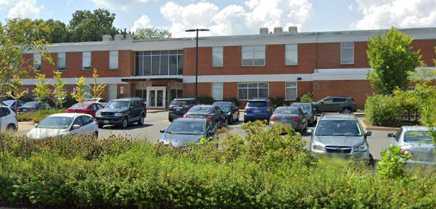University of Virginia Medical Center

Contact Details
-
Name:University of Virginia Medical Center
-
Address:1215 Lee Street
Charlottesville, VA - 22903 -
Phone:434-924-0211
-
Email:
-
Instagram:
-
Website:
Description
There are currently state and federally funded or sponsored drug and alcohol treatment centers in the state of Virginia
Questions & Answers
Help others like you find out more about University of Virginia Medical Center. Do you know the answers to any of these questions? Contribute now and help others like you.
What kinds of care do they offer?
-
Mental health treatment
Includes interventions such as therapy or psychotropic medication that treat a person's mental health problem or condition, reduce symptoms, and improve behavioral functioning and outcomes.
-
Substance use treatment
Refers to a broad range of activities or services, including identification of the problem (and engaging the individual in treatment); brief interventions; assessment of substance abuse and related problems including histories of various types of abuse; diagnosis of the problem(s); and treatment planning, including counseling, medical services, psychiatric services, psychological services, social services and follow-up for persons with alcohol or other drug problems (Institute of Medicine, 1990).
-
Treatment for co-occurring substance use plus either serious mental health illness in adults/serious emotional disturbance in children
Housing for individuals recovering from substance abuse that is designed to provide a drug and alcohol-free living environment and appropriate support services to facilitate movement to independent living. Such housing includes transitional living, sober houses, sober living, recovery houses, and 3/4 houses.
What types of treatment approaches do they offer?
-
Individual psychotherapy
Focuses on a patient's current life and relationships within the family, social, and work environments through one-on-one conversations with a therapist. The goal is to identify and resolve problems with insight, as well as build on strengths.
-
Couples/family therapy
Are two similar approaches that use discussions and problem-solving sessions facilitated by a therapist to help couples and family members improve their understanding of and the way they respond to one another. This type of therapy can resolve patterns of behavior that might lead to more severe mental illness. Family therapy can help educate about the nature of mental disorders and teach skills to better cope with the effects of having a family member with a mental illness, such as how to deal with feelings of anger or guilt.
-
Group therapy
Involves groups of usually 4 to 12 people who have similar problems and who meet regularly with a therapist. The therapist uses the emotional interactions of the group's members to (1) help them get relief from distress and (2) possibly modify their behavior.
-
Cognitive behavioral therapy
Involves recognizing unhelpful patterns of thinking and reacting, and then modifying or replacing these with more realistic or helpful ones. The therapy can be conducted with individuals, families, or groups, and clients are generally expected to be active participants in their own therapy.
-
Dialectical behavior therapy
A cognitive behavioral treatment approach with two key characteristics: a behavioral, problem-solving focus blended with acceptance-based strategies, and an emphasis on dialectical processes. "Dialectical" refers to the issues involved in treating patients with multiple disorders and to the type of thought processes and behavioral styles used in the treatment strategies. DBT has five components: (1) capability enhancement (skills training); (2) motivational enhancement (individual behavioral treatment plans); (3) generalization (access to therapist outside clinical setting, homework, and inclusion of family in treatment); (4) structuring of the environment (programmatic emphasis on reinforcement of adaptive behaviors); and (5) capability and motivational enhancement of therapists (therapist team consultation group). DBT emphasizes balancing behavioral change, problem-solving, and emotional regulation with validation, mindfulness, and acceptance.
-
Activity therapy
Includes art, dance, music, recreational and occupational therapies, and psychodrama.
-
Electroconvulsive therapy
Also known as ECT, uses low-voltage electrical stimulation of the brain to treat some forms of major depression, acute mania, and some forms of schizophrenia. This potentially life-saving technique is considered only when other therapies have failed, when a person is seriously medically ill and/or unable to take medication, or when a person is very likely to commit suicide. Substantial improvements in the equipment, dosing guidelines, and anesthesia have significantly reduced the side effects.
-
Smoking not permitted
Smoking is not allowed.
What type of setting is this location?
-
Hospital inpatient/24-hour hospital inpatient
Medical treatment that is provided in a hospital or other facility and requires at least one overnight stay.
Who is responsible for the operation of this facility?
-
State government
Government of a country subdivision in a federal form of government, which shares political power with the federal or national government and must meet certain standards set by the federal government, but are free to expand beyond what exists at the federal level and improve services, access, and protections for consumers, such as mental health and substance abuse services, in that state.
What types of payment or funding do they accept?
-
Cash or self-payment
Payment for treatment is made by the person directly, through cash or other means, rather than using health insurance.
-
Medicaid
A joint federal and state program that helps with medical costs for some people with low incomes and limited resources. Medicaid programs vary from state to state.
-
Medicare
The federal health insurance program for people age 65 and older and people with disabilities.
-
State-financed health insurance plan other than Medicaid
-
Private health insurance
-
Federal military insurance (e.g., TRICARE)
What language services are offered?
-
Sign language services for the deaf and hard of hearing
Service provided for persons who are deaf and hard of hearing.
What ancillary services are offered at this facility?
-
Family psychoeducation
Helps consumers and their families and supporters, through relationship building, education, collaboration, and problem solving to: 1) learn about mental illness; 2) master new ways of managing their mental illness; 3) reduce tension and stress within the family; 4) provide social support and encouragement to each other; 5) focus on the future; and 6) find ways for families and supporters to help consumers in their recovery.
What specific pharmacotherapy treatments do they provide?
-
Nicotine replacement
Administers nicotine to the body by means other than tobacco, without other harmful chemicals found in tobacco. Common forms of nicotine replacement therapy are nicotine patches, nicotine gum or lozenges, nasal spray and inhaler. The goal of nicotine replacement is to prevent cravings in a tobacco user, allowing the person to abstain from tobacco.
-
Non-nicotine smoking/tobacco cessation
Are medications that do not contain nicotine but act on the brain to reduce a person's craving for tobacco. Some common medications are Bupropion (Zyban, Wellbutrin), and Nortriptyline (Pamelor). Medications are often prescribed in conjunction with behavioral counseling or support groups to provide the best chance for achieving long-term smoking abstinence. (http://www.mayoclinic.com)
-
Chlorpromazine
Chlorpromazine is used to treat the symptoms of schizophrenia and to treat the symptoms of mania in people who have bipolar disorder. It helps you to think more clearly, feel less nervous, and take part in everyday life. It can reduce aggressive behavior and the desire to hurt yourself/others. It works by helping to restore the balance of certain natural substances in the brain.
-
Fluphenazine
Fluphenazine is a decades-old antipsychotic medication used to treat schizophrenia and psychotic symptoms such as hallucinations, delusions, and hostility.
-
Haloperidol
Haloperidol is used to treat psychotic disorders and is also used to control motor tics and verbal tics in adults and children who have Tourette's disorder. Haloperidol is also used to treat severe behavioral problems such as explosive, aggressive behavior or hyperactivity in children who cannot be treated with psychotherapy or with other medications. Haloperidol is in a group of medications called conventional antipsychotics. It works by decreasing abnormal excitement in the brain.
-
Thiothixene
-
Trifluoperazine
-
Aripiprazole
-
Clozapine
-
IIoperidone
-
Lurasidone
-
Olanzapine
-
Paliperidone
-
Quetiapine
-
Risperidone
-
Ziprasidone
-
Antipsychotics used in treatment of SMI
A multi-disciplinary clinical team approach, helps those with serious mental illness live in the community by providing 24-hour intensive community services in the individual's natural setting.
What types of screening and assessment methods are used here?
-
Screening for tobacco use
Determines a client's use of tobacco products, such as cigarettes, cigars, pipe tobacco, or smokeless tobacco. It is generally recommended that providers screen for tobacco use on a regular basis by asking clients, as they are seen, about their current and past use of tobacco products and their exposure to secondhand smoke or tobacco.
What kinds of education and counseling services are offered here?
-
Smoking/vaping/tobacco cessation counseling
Includes interventions for persons who use tobacco and want help with stopping, including behavioral support or counseling in groups or individually.
What age groups are accepted here?
-
Young Adults
Facility accepts young adults (13-25) for treatment.
-
Adults
Facility accepts adults (26-64) for treatment.
-
Seniors
Facility accepts seniors (65 or older) for treatment.
What types of testing do they offer?
-
HIV testing
Determines whether you are infected with HIV, a virus that weakens the immune system and can lead to acquired immunodeficiency syndrome.
-
STD testing
Testing to determine the type of sexually transmitted disease a person may be carrying.
-
TB screening
Skin tests that are used to screen people who are at high risk for TB exposure such as people with diseases or conditions that weaken their immune system.
-
Metabolic syndrome monitoring
-
Testing for Hepatitis B (HBV)
Involves blood test that measure HBV (Hepatitis B virus) antigens and antibodies.
-
Testing for Hepatitis C (HCV)
Test for Hepatitis C, which is usually done and recommended for persons currently injecting drugs, ever injected drugs, were prior recipients of transfusions or organ transplants, or have certain medical conditions, including persons: 1. who received clotting factor concentrates produced before 1987 2. who were ever on long-term hemodialysis 3. with persistently abnormal alanine aminotransferase levels (ALT) 4. who have HIV infection
-
Laboratory testing
Do they offer any emergency mental health services?
-
Psychiatric emergency onsite services
A self-initiated community partnership between local law enforcement, county health services, mental health advocates, and mental health consumers. It is designed to address the needs of mental health consumers who enter the judicial system during a crisis state.
What type of facility is this?
-
Separate inpatient psychiatric unit of a general hospital
Is vaping allowed at this facility?
-
Vaping not permitted
How do I apply for admission at this location?
Have you been to this facility? What was your experience?
Is there a wait-list for treatment center?
Is any payment required?
Related Posts
Region Ten Community Services Board
- Charlottesville, VA
- 1.45 miles away

